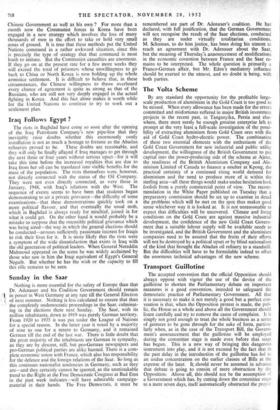Iraq Follows Egypt ?
The riots in Baghdad have come so soon after the opening of the Iraq Petroleum Company's new pipe-line that they inevitably raise doubts whether this enormously costly installation is not as much a hostage to fortune as the Abadan refineries proved to be. These doubts are reasdnable, and they will only be finally allayed if Iraq manages to get through the next three or four years without serious upset—for it will take this time before the increased royalties that are due to Iraq from her oil can be translated into visible benefits for the mass of the population. The riots themselves were, however, not directly connected with the status of the Oil Company. They were not even directly connected, as were those in January, 1948, with Iraq's relations with the West. The sequence of events seems to have been that students began demonstrating to air a private grievance—the difficulty of some examinations—that these demonstrations quickly took on a more political flavour, and that eventually the usual mob, which in Baghdad is always ready for mischief, joined in for what it could get. On the other hand it would probably be a mistake to suppose that the ostensible political grievance which was being aired—the way in which the general elections should be conducted—arouses sufficiently passionate interest for Iraqis to risk their lives for it. It is more likely that the riots were a symptom of the wide dissatisfaction that exists in Iraq with the old generation of political leaders. When General Nureddin Mahmoud appeared on the scene he was widely acclaimed by those who saw in him the Iraqi equivalent of Egypt's General Neguib. But whether he has the wish or the capacity to fill this role remains to be seen.


































 Previous page
Previous page